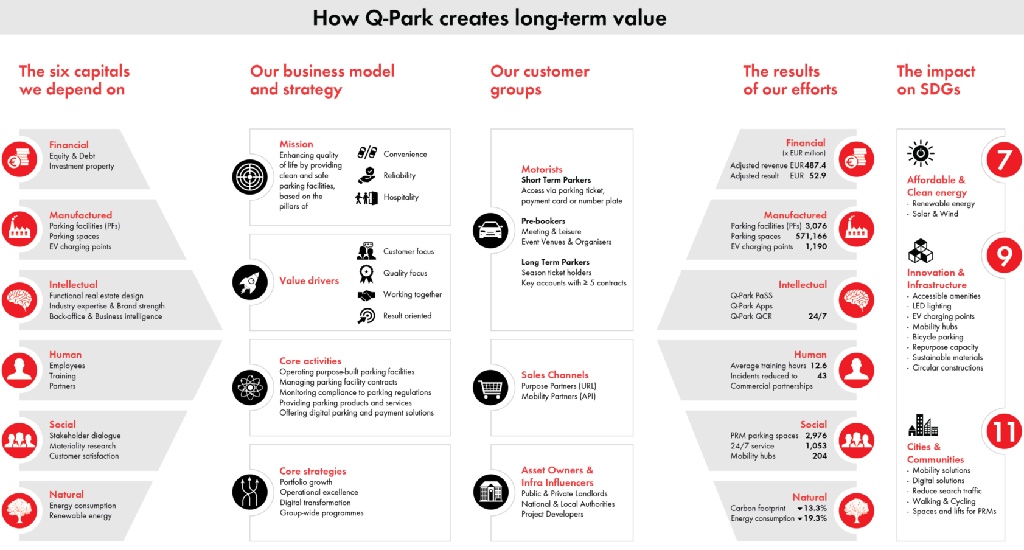How we create value
Ambition
Q-Park’s ambition is to be the strongest European car parking operator that best understands and seizes car parking market opportunities. Our focus is to create value for all stakeholders: shareholders, investors, landlords, municipalities, commercial partners, customers and employees. Ongoing dialogue with our stakeholders is vital to ensure that their interests and needs are represented in the choices we make.
Strategy
We operate in a dynamic environment. To provide a dynamic response to external events and market trends our plans are built on five strategic areas:
portfolio of strong locations;
differentiated contract types & propositions;
digital, commercial & pricing capabilities;
operational excellence;
mobility partnerships.
We maintain and strengthen our position by remaining alert to new developments and responding with forward-looking strategies:
We aim to gain substantial benefit by utilising our scale of operations and market position.
We want to increase the margins on our operating activities by focusing on efficiency.
We focus on increasing our market share through acquisitions and different types of lease and management contracts.
Impact on society
Our aim in society is to be an integral part of city mobility policies and to work towards sustainable freedom of mobility. We achieve this through adopting a fair pricing policy, facilitating actual and relevant information provision, and integrating with alternative modes of transport.
We create sustainable value in society with our parking products: they help to improve quality of life and to reduce air pollution generated by traffic cruising for a place to park.
We add value by providing functional services and digital solutions.
Value creation model
By offering a substantial portfolio of parking facilities in urbanisations throughout Western Europe, we are able to have an impact on mobility needs and related issues. On the one hand there is an individual need to go places for educational, economic, social and leisure purposes – whenever possible and without any hassle. On the other, there is a societal need to improve the liveability of cities, increase safety for pedestrians and cyclists, provide access to green and public spaces, support economic development, and offer affordable and equitable access for all.
The negative impact by passenger cars on, for example, air quality and pedestrian safety, needs to be balanced by the positive impact on economic development and individual freedom of mobility. And the positive impact of off-street parking on space for people (pavements, bicycle lanes, urban parks and town squares) needs to offset the negative impact of decreasing on-street (sometimes even free) parking and thus proximity to city amenities and vital functions.
An even better example may be the need to reduce energy consumption on the one hand while increasing the number of EV charging points on the other.
With this model we aim to give insights into our efforts, from capital input to long-term impact, serving our stakeholders and society at large. If you require detailed information on the results or our efforts, take a look at the Q-Park Liveability Model.
Figure 6 Value creation model

